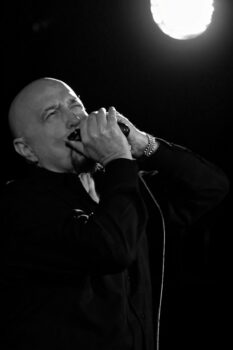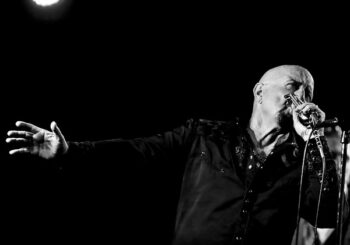Interview: The Fabulous Thunderbirds’ Kim Wilson Talks His New Record, & Improvising the Blues.
The long-running front man for The Fabulous Thunderbirds, Kim Wilson has released a new solo album, Take Me Back – The Bigtone Sessions just this week.
13th Floor’s Marty Duda spoke to Kim Wilson as he was literally on the road, driving through California. Kim’s new album is made up of old favourites (Slow Down, Money, Marbles & Chalk) along with a few originals. As always. the vocalist/harmonica player has a bevy of righteous players on hand to back him up. But don’t take our word for it, listen and read for yourself.
Follow Kim Wilson and The Fabulous Thunderbirds: WEBSITE FACEBOOK MC RECORDS INSTAGRAM TWITTER
Listen to the interview here:
Or, read a transcription of the interview here:
M: Whereabouts are you?
K: I’m driving back out of San Diego.
M: How are things there? I know you’ve had some pretty bad fires. Is it clearing up?
K: We haven’t had any around here.
M: That’ a relief.
K: A little further up in northeast L.A. area up by the mountains it’s terrible. The thing is we have, knock on wood, not suffered from the fire season yet.
 M: Well that’s good and your staying away from Covid and staying isolated?
M: Well that’s good and your staying away from Covid and staying isolated?
K: I mean I still go to the store. I just went down to see my buddy, but I’m not doing any gigs. People are inside. It’s all pretty safe.
M: Excellent. So you’ve got a new album coming out in about a week or so? How are you feeling about it?
K: I feel fantastic. I’m getting a lot of great press. I get to talk to people like you from a beautiful country I’ve been to before.
M: The title of the album is Take Me Back (The Bigtone Sessions). So, for folks that are not familiar, what is the Bigtone studio scene?
K: It was run, engineered, and produced by Big Jon Atkinson. He calls his studio Bigtone. When I recorded with him all the stuff off this particular CD was done either in San Diego or Hayward California.
We cut everything live to tape except for the hall words, you know, we didn’t really go over three takes of the song otherwise you just go to another song. So a lot of improvisation. It was a lot of fun. The musicians are fantastic, really the top guys.
Plus they’re my friends so we had such a good time in the studio. There are no personality conflicts. Everybody’s just having a ball, and it’s like one big happy family in there.
M: Seems like the way it should be. Has it always been that way for you making music? A big happy family vibe?
K: Pretty much, there have been a couple of little hiccups but not too bad. In hindsight, probably at the time, they were the worst time of my life but on a grand scale, they were pretty insignificant.
M: That’s good to know. Time is a good perspective on things. So, from what I understand, you recorded most of this stuff pretty much live in mono in the studio. How do you get everybody is ready and revved up to be able to do that?
K: Well, everybody’s always ready and revved up. Believe it not there was not one rehearsal before any of these sessions. I’m sitting on hundreds of tracks, between Big Jon and Bigtone, its huge amount, and there was no rehearsal for any of them.
 When you play this kind of music and you’re doing like a cover, for instance, you don’t tell the band the name of the band. But you know they are going to know it and they are going to play it too close to what the original was. So, that’s how I’m able to put my own stamp on things is because I’m able to keep it from the band and they just play whatever they play. It’s a very cool thing to actually witness when the whole band gets started. It’s very exciting.
When you play this kind of music and you’re doing like a cover, for instance, you don’t tell the band the name of the band. But you know they are going to know it and they are going to play it too close to what the original was. So, that’s how I’m able to put my own stamp on things is because I’m able to keep it from the band and they just play whatever they play. It’s a very cool thing to actually witness when the whole band gets started. It’s very exciting.
M: I assume you’re talking about a tune like Slow Down, the old Larry Williams number which of course we’ve heard quite a bit over the past 60 years or so. How do you think you put your stamp on that one?
K: It’s really the voice. I don’t think there’s a sax solo on the original. I think there are about 80 guitars including. I think we did it justice. It was a very exciting track. I was just listening to it. I’m very proud of this bunch of music that I’m putting out here. I’m so proud of the guys, they are always great of course but they just gave it to me. I really appreciate it.
M: Tell me a little bit about the guys. I think I know who is playing: Rusty Zinn is on guitar, Marty Dodson on drums, there’s Troy Sandow and Kid Andersen. Have you guys been playing a while together or only together for this album?
K: I have known these guys for a long time. I play with all of them forever. So like I said it’s so easy because everybody is on the same page. Everyone knows the songs; you don’t even have to rehearse. You just call the song on and start playing. They just fall right in, it’s fantastic.
M: One of the tunes I wanted to talk about was Money, Marbles and Chalk which I wasn’t familiar with and I believe was recorded by Patti Page back in 1949. What brought that one up for you?
K: That’s a Jimmy Rogers song from the early 50s or mid-50s that is just a very traditional Chicago blues song. It’s different than the original. I love singing Jimmy Rogers songs. He was a friend of mine, he was like family. I’ve done some worth with him. I recorded an album with him and produced it at Antone’s. A lot of people liked that record.
M: That scene at Antone’s was significant and you guys were a significant part of it. Is it still happening there in Austin? Last time I was in Austin it seemed to have changed quite a bit. It grew.
K: Yes it’s just got way bigger. It’s still the same. Antone’s is still there. The new club is smaller but it’s pretty nice. People just stand up in the middle with the tables on the outside. I’ve played there a couple of times with the T-Birds.
 M: Speaking of the T-Birds are they still an ongoing concern? I have a feeling they are but I wanted to check in with you about that.
M: Speaking of the T-Birds are they still an ongoing concern? I have a feeling they are but I wanted to check in with you about that.
K: Oh yeah. That’s a large share of my work. I’m working with them. Every two or three weekends we go to Europe but right now its nothing.
M: When was the last time you played?
K: It was March.
M: Oh man, it’s got to be killer, especially with a record like this going out.
K: I’ve played online a couple of times
M: Not quite the same is it?
K: No it’s not the same.
M; you need people.
K: It’s going to be a while before it gets anywhere near normal.
M: Maybe I could talk about your harp playing a little bit. There’s plenty on the record, Winging It, the second track, is a nice little workout. I’m wondering playing the harmonica and the blues go hand and hand. What is it about that instrument that is compatible with the type of music and not necessarily other times?
K: When the Germans first invented the harmonica it was for folk music and stuff like that. They had no idea how it was going to work for blues music! I guess because it was cheap everybody had one, picked one up, played on the street. It became contagious. There’s a guy named Noah Lewis who played with Cannon’s Jug Stompers I think they were called back in the 60s. He was the first guy who played what you call ‘cross harp’ which is the normal kind of harmonica you usually hear these days.
 I believe he was the first guy, somebody told me that. After that things kept getting more bluesy. There was all this jazz stuff going on at the same time back then. It was amazing that you had people like Noah Lewis or later like Muddy [Waters] in the late 40s or Tampa Red, Big Maceo, and you had Duke Ellington and Illinois Jacquet and all these other guys playing. And the be-bop stuff was starting to happen. It was an incredible period of time for great music.
I believe he was the first guy, somebody told me that. After that things kept getting more bluesy. There was all this jazz stuff going on at the same time back then. It was amazing that you had people like Noah Lewis or later like Muddy [Waters] in the late 40s or Tampa Red, Big Maceo, and you had Duke Ellington and Illinois Jacquet and all these other guys playing. And the be-bop stuff was starting to happen. It was an incredible period of time for great music.
There are some jazz people who play the harmonica, a guy named Larry Adler played back then with Django Reinhardt and Toots Thielemans came on a little later than that. But there were people like Don Letts playing the harmonic with big bands. They were playing jazz. The harmonica kind of fitted in a little bit everywhere. They played it in country music. Roy Acuff had an incredible harmonica player in his band. Harmonicas played a role in a lot of different types of music.
M: I grew up in western Pennsylvania so I’ve heard a bit of polka music in my time.
K: Harmonic is like a small accordion.
M: You’ve been playing the harmonica for quite a while. Is it the kind of instrument you need to evolve with, or once you got it do you have it? How do you approach playing?
K: You’re always learning. It takes a long time to do anything good. It took me maybe longer than most people. I don’t know. I’ve had a great ride working and learning all this stuff. When I was a kid I was in a band immediately after I started playing and after a year I was playing with the masters, which is crazy. But the deal is how fast you learn. After I had been playing for a few years it was a drastic difference. After id been playing ten years it was that much more. So after 50 years …pretty crazy.
M: Now getting back to the record, I wanted to talk about a tune called taking me back. To me, it had a very kind of Honky Tonk Bill Doggett vibe to it is that where you were going with that?
K: You could compare it, sure. It’s not really consciously where I was going with it. It’s a similar kind of track, by the sax. Not exactly the same but you could compare the vibe, no doubt.
M: I don’t have the songwriting credits which ones are necessarily originals and which ones are covers. Forgive me for that.
K: That’s a Little Walter cover. I’ve been doing it for many years and I have never recorded it.
M: Are there songs that you have written on the record?
K: Yes. Fine Little Woman, Play Me, It Takes Time. There are four instrumentals that I wrote also.
M: Are you writing all the time, or do you write specifically for a particular project?
K: I try and write. It’s hard for me to do without motivation. I have been writing. I got Steve Gomes up to the house before all of this started and we got a few singles together. That was nice. He’s a great songwriter, Steve my bass player. We’re pretty compatible as far as being songwriting partners. It’s pretty good.
M: Of course the blues have bee around forever. A lot of people feel like everything’s been done with it. But obviously, that’s not the case, how do you look at the blues in general and avoid repeating what’s already been done?
 K: The beautiful thing about blues music…. well, in general, I don’t feel great about it. That’s just the way that is. What keeps the music fresh not only blues but also all types of music is that you just totally improve. You are never playing the same thing the other guy plays. Jazz people for instance, how do you tell the difference between today’s jazz and the jazz of the 40s and 50s ? For one thing, the way they record it now is much more different. They are recording a lot of things in digital, it doesn’t sound as good in digital.
K: The beautiful thing about blues music…. well, in general, I don’t feel great about it. That’s just the way that is. What keeps the music fresh not only blues but also all types of music is that you just totally improve. You are never playing the same thing the other guy plays. Jazz people for instance, how do you tell the difference between today’s jazz and the jazz of the 40s and 50s ? For one thing, the way they record it now is much more different. They are recording a lot of things in digital, it doesn’t sound as good in digital.
M: When you say you’re looking at the blues not necessarily in a good situation these days do you mean as far as a commercial perspective or musical perspective?
K: A musical perspective. There are a lot of things I don’t like but that’s okay. Nothing I can do about it. I like to think about it everything that I think is real. It’s hard to make that distinction sometimes. I don’t want to get negative about it. I’m having a great time. I enjoy music more than I ever have.
M: I guess it’s one of those things when you know what’s good and what’s bad just internally and you just go with that.
K: Absolutely.
M: Have you been being creative while you’re being in lockdown? Or just chilling?
K: I’ve picked up a harmonica and playing a little bit. I listen to a lot of great music, to get some ideas. I have a few guitars I play around the house. I do some writing. I try to write a book.
M: is it a biography, or autobiography?
K: Autobiography I guess if I’m doing it right?
M: You must have some stories to tell?
K: I’ve got a huge amount of stories. A great collection that id like to share it with people.
M: I’m sure they would want to hear about it. I mean, just the fact that you were working with people like Muddy Waters when you were a kid, that’s going to blow peoples minds right there. And make it feel like these things are possible.
K: Oh yeah, that’s very true. There’s one problem, the old guys are dead.
M: They are indeed. It’s a sad situation. but sadly inevitable.
K: It was an incredible period of time. They saw some incredible stuff. Talk about stories, jeez. It’s insane. I know a few of them. It’s like wow.
M: Is there anybody on the current scene that you are impressed with?
K: Let me see. Big Jon, to me he’s the future. I love James Hunter. I love what he does. He’s an incredibly talented guy. Rick Estrin is a great harmonica player, Jerry Portnoy is a great harmonica player. They’re not kids but, that’s who I like. I think Charlie Musselwhite and Elvin Bishop have an album out now.
M: I believe you are correct. It just came out I think. It’s good to know those guys are still around.
K: Absolutely.
M: Well I will let you back to your driving. Hopefully, things improve in California and the US in general because it’s a crazy place in general, hopefully, you can come down to Auckland and play some blues down here.
K: Sounds good. I would love it. I haven’t been there in a long time.
M: Well it’s about time. We will get the borders open again soon and hopefully get some music going.
K: Awesome great to talk to you.
Kim Wilson’s new album, Take Me Back – The Bigtone Sessions, is out now
https://youtu.be/EB-ToaI1K3I
- New Music Friday: 13th Floor New Album Picks: April 19, 2024 - April 19, 2024
- JessB – Talk Of The Town: 13th Floor New Song Of The Day - April 19, 2024
- The Bacon Brothers – Ballad Of The Brothers(Forosoco/Forty Below) - April 18, 2024
